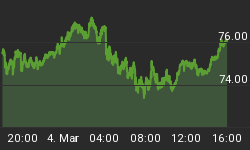The last of my series of three important charts covers: The Dow Jones Industrials divided by the price of gold (Dow/Gold Ratio). We are starting to see this chart more and more. In this article, I will do something with it I haven't seen yet, and something I feel is an important exercise if you believe history will repeat itself. Below is the monthly chart from 1980.


The 80 year chart of the Dow/Gold Ratio provides a useful tool in many ways. It has been a strong barometer for pending bear markets when the ratio has rolled over from extreme levels. Secondly, in each of the most significant bear markets in the past 100 years, the ratio has bottomed at similar levels.
I would like to ask the reader to indulge me in two assumptions:
-
The 80 year chart of the Dow/Gold Ratio is currently forecasting a significantly longer or protracted bear market compared to those of the last 20 years, and possibly a deflationary period or cycle.
-
During such an economic period, this ratio will bottom at or below 5, as it's done in significantly weak economic periods of the past 100 years.
I ask for these two assumptions, because if they turn out to be correct and history repeats itself, we should be evaluating the Dow/Gold Ratio in an entirely new way. The current Dow/Gold Ratio is 11.47. While this number has trend down significantly from its peak in 2000, it is well above (2-5 times) the levels the ratio has bottomed during significantly weak economic times of the past. Gold recently closed at $730.30, and if we use a Dow/Gold Ratio of 5, the Dow should be trading at 3,651.50. OUCH! And no, I'm not suggesting the Dow is headed to that level, I do hope that gets your attention for the following exercise.
When we look at the chart of the Dow Jones over the past 30 years, you will see that below the 2002 lows, there is virtually no technical support from prior price peaks or price patterns, which makes it very difficult to gauge at potential market bottom should we trend below the 2002 lows.
So, I propose we use Fibonacci ratios, and estimate gross correctional moves down from the Dows peak of 14,164 to project possible lows over the coming months or years, and use a Dow/Gold Ratio of 5 to gauge the potential price of gold.
Fib. Ratio | Point Loss | Dow Low | Dow/Gold Ratio | Projected Gold |
1) 50.0% | 7,082 | 7,082 | 5 | $1,416.40 |
2) 61.8% | 8,753 | 5,411 | 5 | $1,082.20 |
3) 66.7% | 9,447 | 4,717 | 5 | $943.40 |
4) 78.6% | 11,133 | 3,031 | 5 | $606.20 |
The purpose of this exercise is to hopefully understand the possible relative performance of gold and the Dow. I believe history repeats itself, and in that view, I expect the Dow/Gold Ratio to visit 5 or below in the coming years. So, if we look at the table above, and should the stock market correct to any of the first 3 levels and we achieve the ratio of 5, the price of gold actually goes higher from current levels, and modestly lower under the fourth scenario. Even from the Dows current level, gold outperforms the Dow in relative terms in all four scenarios should we trend to a Dow/Gold Ratio of 5.
Also, should the ratio hit extreme low levels around 2, as it did in both major bear markets of last century, than the price of gold will have to soar past those projections in the above table. A summary using a Dow/Gold Ratio of 2 is below:
Fib. Ratio | Point Loss | Dow Low | Dow/Gold Ratio | Projected Gold |
1) 50.0% | 7,082 | 7,082 | 2 | $3,541.00 |
2) 61.8% | 8,753 | 5,411 | 2 | $2,705.50 |
3) 66.7% | 9,447 | 4,717 | 2 | $2,358.50 |
4) 78.6% | 11,133 | 3,031 | 2 | $1,515.50 |
This mathematical exercise is not intended to make one bullish about gold or bearish about the Dow. Nor is it intended to forecast the price levels of either asset. It's a simple mathematical exercise to understand the relative performance of the two assets should history repeat itself. The probabilities of a more severe bear market that lasts longer have not been greater in decades than right now. Thus, shouldn't one consider some weighting of their personal net worth in precious metals to preserve their wealth, and possibly increase that wealth?
In conclusion, I Hope this exercise helps all think a little outside the box about preserving their new worth.















